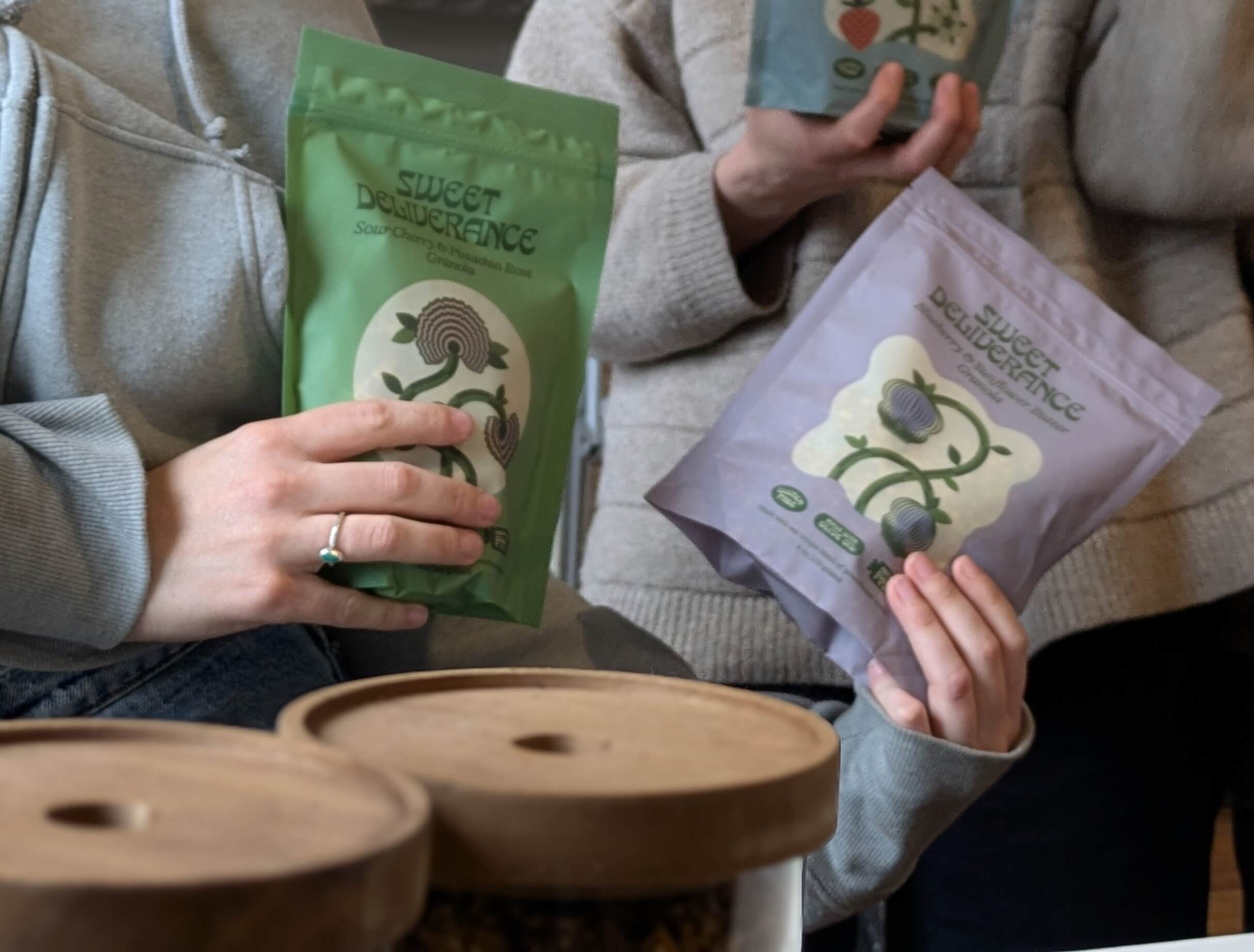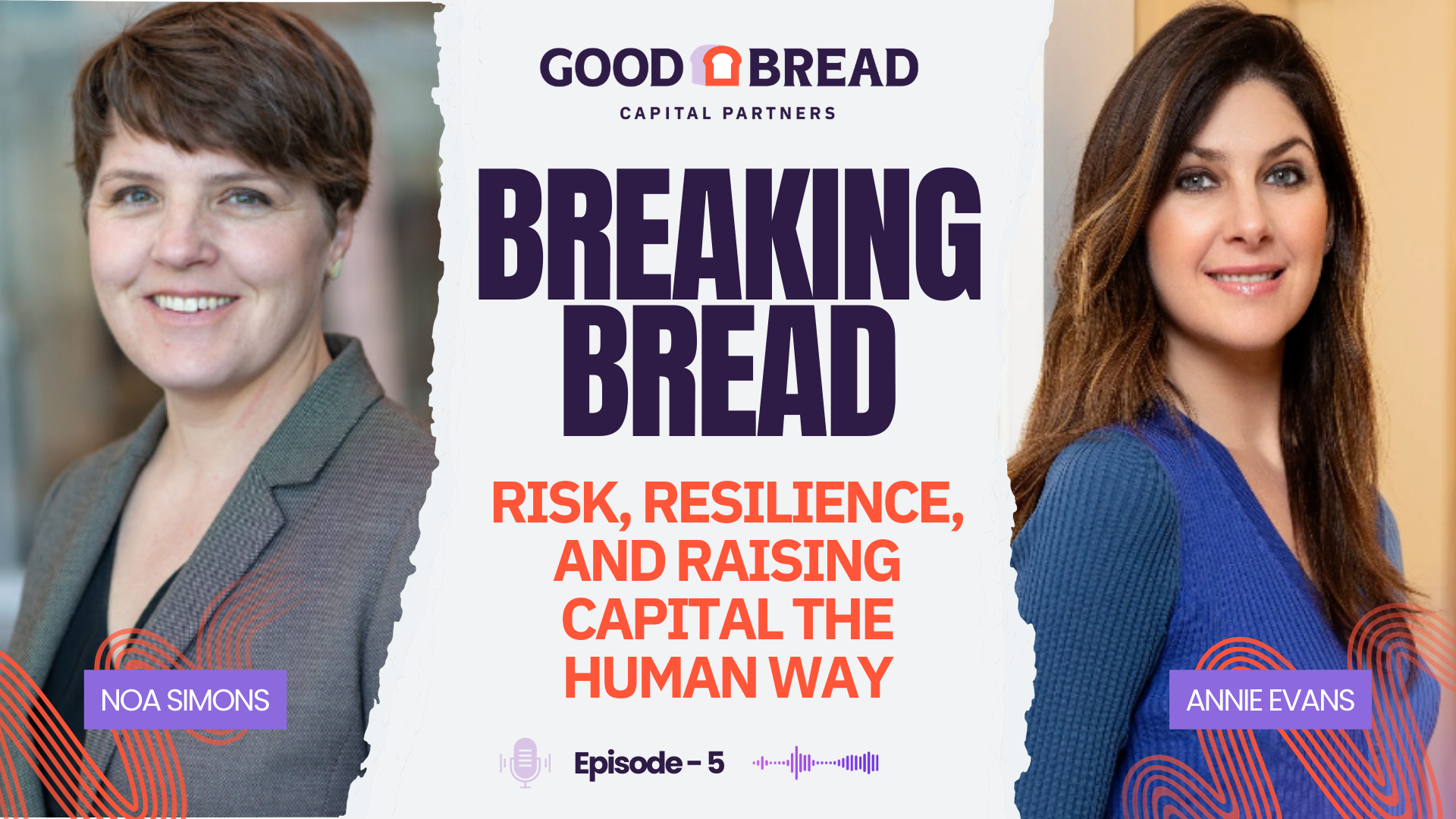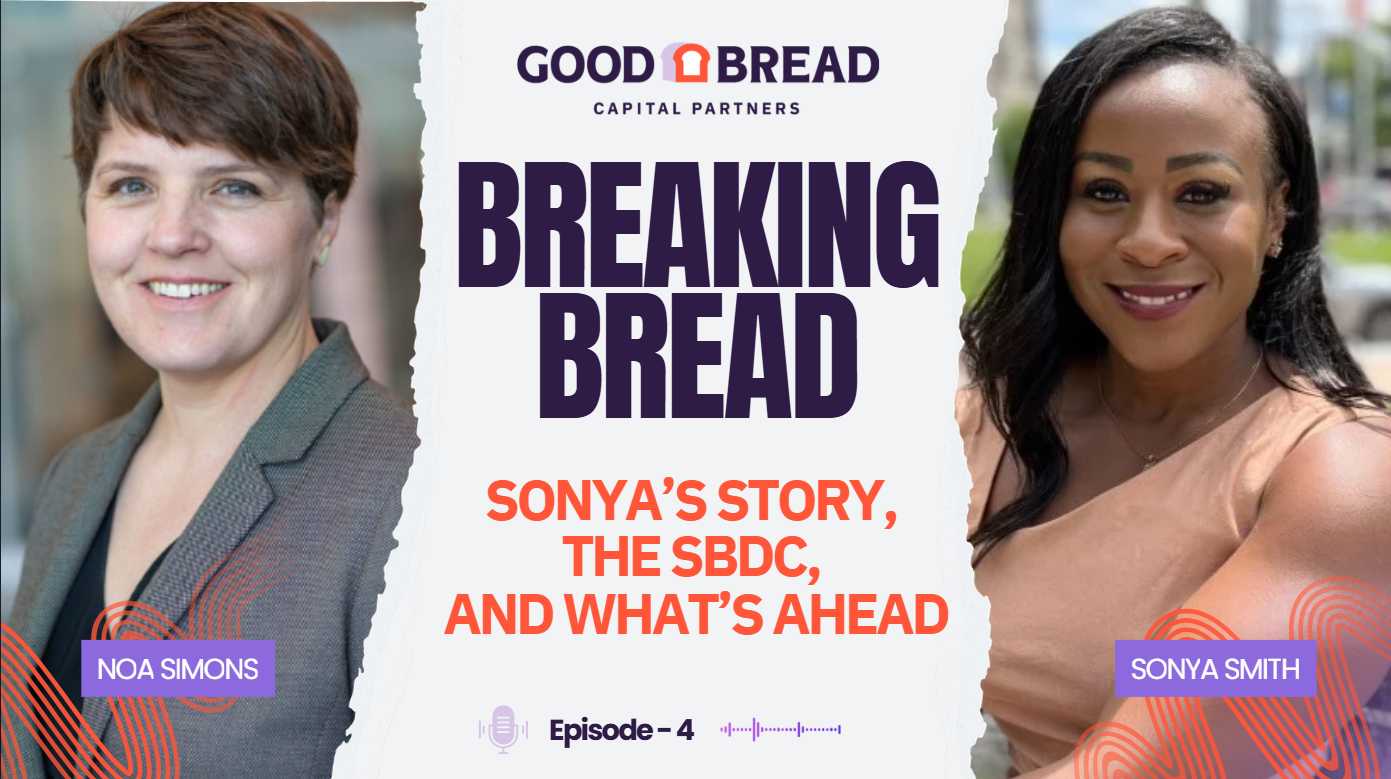When Kelly Geary started mixing up savory granola in her Hudson Valley kitchen, she had no idea she was creating the foundation for a business that would capture hearts, fill pantries, and prove that sometimes the most unexpected recipes can rise to become something extraordinary.
I’ve had the privilege of working with hundreds of entrepreneurs over the years, but Kelly’s story particularly resonates with me. It’s a perfect example of why we started GoodBread—to support founders who are building something meaningful but find themselves caught between traditional funding gaps.
What’s in this recipe:
The Spark That Started Everything
Kelly’s entrepreneurial journey began long before Sweet Deliverance was even a whisper of an idea. After launching Sweet Deliverance in NYC (a food delivery company focused on sustainable agriculture and food access), she moved to the Hudson Valley when her daughter was born. Like so many of the founders I work with, Kelly thrived on wearing multiple hats, always learning, always pivoting to meet new challenges.
It was in this spirit of continuous exploration that she became a post-partum doula and prenatal chef, diving deep into the unique nutritional needs of expecting mothers. “There was a moment that sparked everything for sure,” Kelly told me during one of our conversations. That moment came when she encountered a client with gestational diabetes.
Here’s what I love about Kelly’s approach: instead of seeing this as someone else’s problem, she saw it as her challenge to solve. She retreated to her kitchen and began experimenting with a turmeric granola recipe designed to avoid blood sugar spikes. What emerged wasn’t just another granola—it was something revolutionary. This wasn’t your typical sweet breakfast fare. Kelly had created something uniquely savory, something that fed both body and soul in ways traditional granola couldn’t.
When Good Granola Becomes Great Business
One by one, Kelly began sharing her creation with all her prenatal nutrition clients. The response was immediate and telling—every client reported the same phenomenon: everyone in their household was “stealing” the granola. Kelly found herself tripling batches just to ensure the expecting mothers actually got their share.
Then 2020 arrived. As someone who’s watched countless entrepreneurs navigate the pandemic’s challenges, I can tell you that Kelly’s response was remarkable. While others retreated, she leaned in. As city dwellers flocked to the Hudson Valley seeking space and safer hospital options, they sought out Kelly’s services.

It was during this time of uncertainty that a moment of clarity emerged from an unexpected source. A client—an out-of-work Broadway director navigating her own pandemic pivot—delivered the line that would change everything: “There’s always going to be hungry moms!” She asked Kelly a question that would prove anything but simple to answer: “Do you want to build a business around this granola?”
Kelly’s response came from years of entrepreneurial experience mixed with newfound maternal perspective: “Yeah, I’m an entrepreneur, and I have so much experience making and selling drinks and food items, but they always felt like too much of a niche to build a business around. Granola was the aha moment.”
This is exactly the kind of lightbulb moment that gets me excited about supporting entrepreneurs. When you find that sweet spot between your expertise, market need, and personal passion—that’s when magic happens.
The Bigger Picture
For Kelly, Sweet Deliverance became more than a business opportunity—it became a mission. “I found something bigger than myself,” she shared with me. “As a mom, this was this opportunity to help lots of others like me, and show my daughter that this is the shot that you’ve been given. People believe in you, supporting you, giving you money. It doesn’t get more obvious that it’s your shot.”
Building a food business meant mastering production, sales, and the delicate art of balancing countless plates simultaneously. Through this process, Kelly discovered perhaps her most valuable lesson: “Learning when to call in help in trying to figure out everything in the business. To lean into my strengths, understand what I’m interested in figuring out myself, and calling in the right people to do the rest.”
This wisdom resonates deeply with what we see at GoodBread. The most successful entrepreneurs aren’t the ones who try to do everything themselves—they’re the ones who recognize when they need support and aren’t afraid to ask for it.
The Funding Equation: Beyond Traditional Banking
When it came time to fuel growth, Kelly found herself in what I call the “entrepreneur’s dilemma”—that frustrating place where you’re too established for friends and family money but not quite ready for traditional institutional funding. Sweet Deliverance was too young for traditional bank lending, couldn’t secure favorable loan terms, lacked the cashflow for a line of credit, and selling more equity felt like giving up too much control of the business she’d built from scratch.
This is precisely why we created GoodBread. I’d connected with Kelly through a mutual friend, and our conversation around how difficult it was to raise capital without giving up equity immediately struck a chord. Here was an entrepreneur doing everything right—building a real business, serving real customers, generating real revenue—but caught in the funding valley of death that traps so many promising companies.
The Growth Challenge: When Opportunity Knocks with a Price Tag
Here’s where Kelly’s story becomes all too familiar for the entrepreneurs we work with. Success in the food industry comes with its own unique set of challenges, and growth opportunities often arrive with significant upfront costs that can make or break a business’s trajectory.
Take Erewhon in LA, for example. This wasn’t just about getting product on shelves—it required $3,250 per SKU just for the privilege of shelf space, plus providing free product upfront. “For two products that meant fronting over $10k just to be on the shelf, and we didn’t just have that kind of cash lying around,” Kelly explained to me.
Sound familiar? This is the exact scenario that keeps me up at night, thinking about all the amazing businesses that miss growth opportunities simply because they don’t have access to the right capital at the right time.
The unpredictability of business added another layer of complexity. “One time a client accidentally placed an order that was 10x bigger than they wanted. So we ramped up production to meet the demand, only to realize it was a mistake. It took us a while to sell through the extra inventory.” These experiences taught Kelly the crucial importance of having cash on hand to weather unexpected storms.
If you’re nodding along thinking “this sounds like my business,” you might want to explore your funding options before your next big opportunity comes knocking.
Putting Capital to Work: More Than Just Money
The funding from GoodBread enabled Sweet Deliverance to make strategic investments that would have been impossible otherwise. Kelly was able to complete a production round while simultaneously developing new packaging that was both more environmentally friendly and more attractive to consumers. “It really boosted our brand, but we couldn’t just afford that without giving up on something else,” she told me.
What I love about working with entrepreneurs like Kelly is watching how the right capital at the right time creates a multiplier effect. This wasn’t just about money—it was about removing the constant stress of choosing between competing priorities. Kelly could finally get ahead on production, ensuring inventory was available to meet demand. She could launch new SKUs to maintain and increase retailer interest. She could invest in marketing and sales to grow beyond her current audience.
If you’re facing similar trade-offs in your business, let’s talk about how we might be able to help.

Looking Forward: The Sweet Future of Strategic Growth
As Sweet Deliverance continues to grow, Kelly remains thoughtful about future funding decisions. The questions she grapples with reflect the complexity of modern entrepreneurship: “Do we sell more equity in order to raise capital, can we find a local bank, line of credit, what are the pros and cons of any of them and what would we have to give up and what makes the most sense.”
These are exactly the conversations I have with entrepreneurs every day. There’s no one-size-fits-all solution, but there are more options than most founders realize. The key is finding the right partner who understands your business, your goals, and your values.
Kelly’s story embodies what makes GoodBread’s mission so vital. Here’s an entrepreneur who identified a real need, created an innovative solution, and built a business that serves her community while providing for her family. Yet without access to flexible capital that doesn’t require giving up equity or control, growth becomes a series of impossible choices rather than strategic opportunities.
Sweet Deliverance proves that sometimes the most impactful businesses start in the most unexpected places—a kitchen, a moment of need, a simple desire to help. With the right support and capital, these humble beginnings can bloom into businesses that nourish communities, support families, and create lasting value.
Learn more about Sweet Deliverance at sweetdeliveranceny.com and discover how GoodBread supports entrepreneurs like Kelly at goodbread.net. Ready to explore funding for your own growing business? Start your application here.


